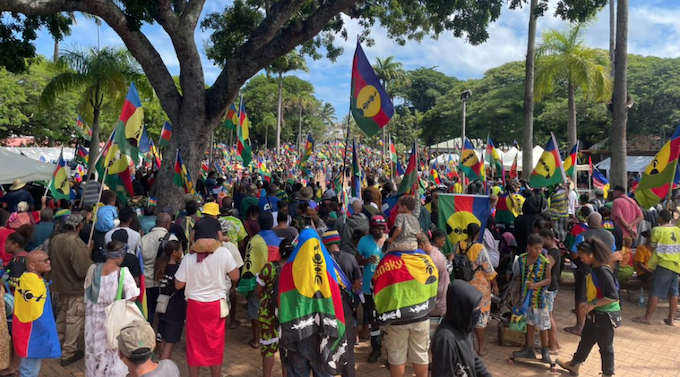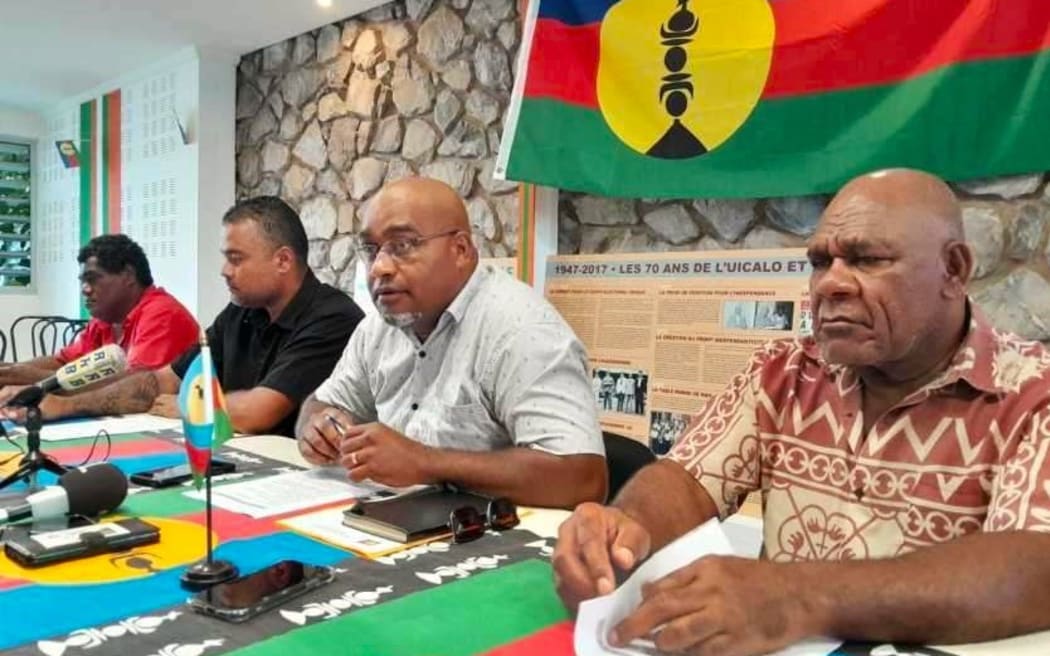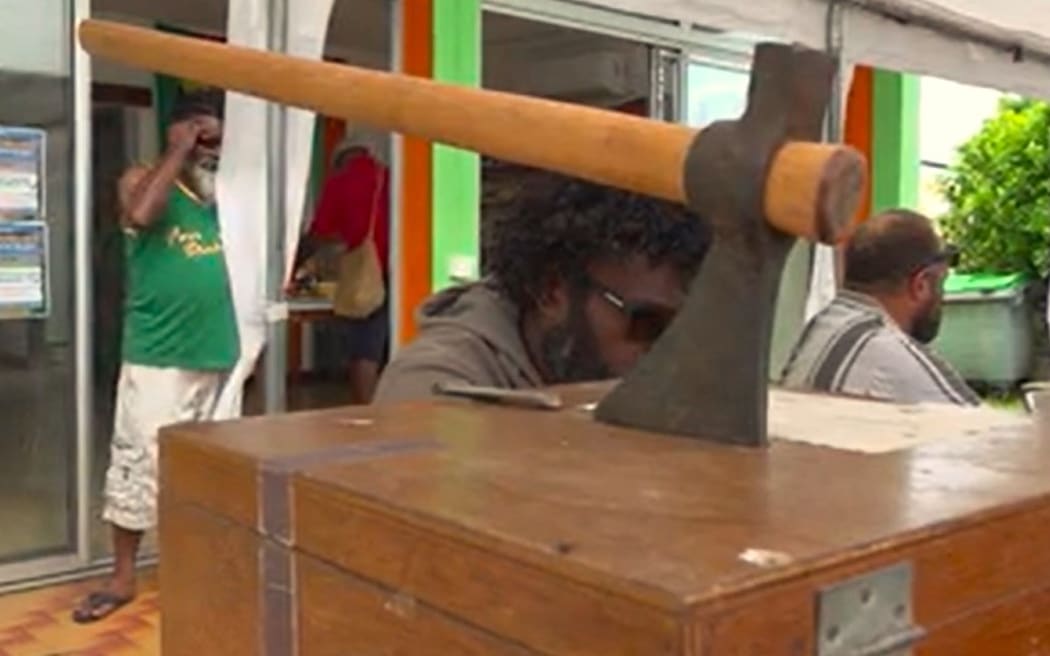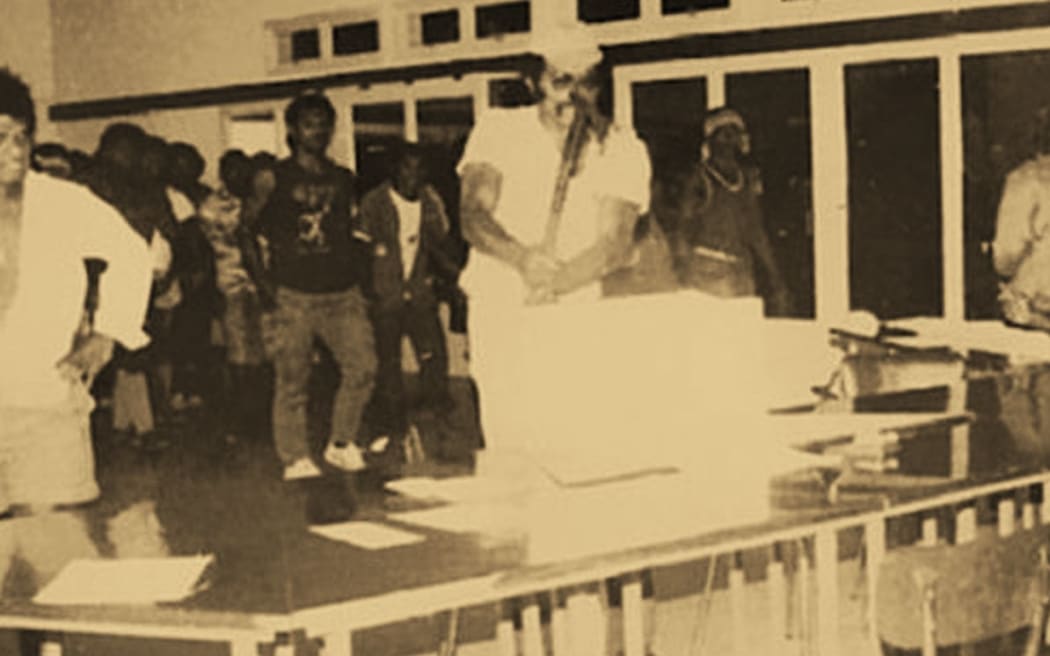By Patrick Decloitre, RNZ Pacific correspondent French Pacific desk
Security forces reinforcements were sent from France ahead of two rival marches in the capital Nouméa today, at the same time and only two streets away one from the other.
One march, called by Union Calédonienne party (a component of the pro-independence FLNKS umbrella) and its CCAT (field action group), was protesting against planned changes to the French Constitution to “unfreeze” New Caledonia’s electoral roll by allowing any citizen who has resided in New Caledonia for at least 10 years to cast their vote at local elections — for the three Provincial assemblies and the Congress.
The other march was called by pro-France parties Rassemblement and Les Loyalistes who support the change and intend to make their voices heard by French MPs.
The constitutional bill was endorsed by the French Senate on April 2.
However, as part of the required process before it is fully endorsed, the constitutional bill must follow the same process before France’s lower House, the National Assembly.
Debates are scheduled on May 13.
Then both the Senate and the National Assembly will be gathered sometime in June to give the final approval.
Making voices heard
Today, both marches also want to make their voices heard in an attempt to impress MPs before the Constitutional Bill goes further.
The pro-France march is scheduled to end at Rue de la Moselle in downtown Nouméa, two streets away from the other pro-independence march, which is planned to stop on the Place des Cocotiers (“Coconut square”).

At least 20,000 participants were estimated to take part.
Security forces reinforcements have been sent from France, with two additional squads (140) of gendarmes, French High Commissioner Louis Le Franc said yesterday.
While acknowledging the “right to demonstrate as a fundamental right”, Le Franc said it a statement it could only be exercised with “respect for public order and freedom of movement”.
“No outbreak will be tolerated” and if this was not to be the case, then “the reaction will be steadfast and those responsible will be arrested,” he warned.
Le Franc also strongly condemned recent “blockades and violence” and called for everyone’s “calm and responsibility” for a “Pacific dialogue in New Caledonia”.

Tight security to avoid a clash
New Caledonia’s Southern Province vice-president and member of the pro-France party Les Loyalistes, Philippe Blaise, told Radio Rythme Bleu he had been working with security forces to ensure the two opposing marches would not come close at any stage.
“It will not be a long march, because we are aware that there will be families and old people,” he said.
“But we are not disclosing the itinerary because we don’t want to give bad ideas to people who would like to come close to our march with banners and whatnot.
“There won’t be any speech either. But there will be an important security setup,” he reassured.
Earlier this week, security forces intervened to lift roadblocks set up by pro-independence militants near Nouméa, in the village of Saint-Louis, a historical pro-independence stronghold.
The clash involved about 50 security forces against militants.
Tear gas, and stones
Teargas and stones were exchanged and firearm shots were also heard.
On March 28, the two opposing sides also held two marches in downtown Nouméa, with tens of thousands of participants.
No incident was reported.
The UC-revived CCAT (Field Actions Coordination Cell, cellule de coordination des actions de terrain), which is again organising today’s pro-independence march to oppose the French Constitutional change, earlier this month threatened to boycott this year’s planned provincial elections.
CCAT head Christian Tein said they were demanding that the French Constitutional amendment be withdrawn altogether, and that a “dialogue mission” be sent from Paris.
“We want to remind (France) we will be there, we’ll bother them until the end, peacefully”, he said.
“Those MPs have decided to kill the Kanak (Indigenous) people . . . this is a programmed extermination so that Kanaks become like (Australia’s) Aborigines,” he told local media.
“Anyone can cause unrest, but to stop it is another story . . . now we are on a slippery slope,” he added.
War of words, images over MPs
Pro-France leader Sonia Backès, during a the March 28 demonstration, had also alluded to “causing unrest” from their side and its ability to “make noise” to ensure their voices are heard back in the French Parliament.
“The unrest, it will come from us if someone tries to step on us,” she lashed out at that rally.
“We have to make noise, because unfortunately, the key is the image,” she said.
“But this little message with the ballot box and Eloi Machoro’s picture, this is provocation.
“I am receiving death threats every day; my children too,” she told Radio Rythme Bleu.

Hatchet and ballot box – the ghosts of 1984
During the CCAT’s press conference earlier this month, a ballot box with a hatchet embedded was on show, recalling the famous protest by pro-independence leader Eloi Machoro, who smashed a ballot box with a hatchet to signify the Kanak boycott of the elections on 18 November 1984.
The iconic act was one of the sparks that later plunged New Caledonia in a quasi civil war until the Matignon Accords in 1988. Both pro-France leader Jacques Lafleur and Lanak leader Jean-Marie Tjibaou shook hands to put an end to a stormy period since described as “the events”.
On 12 January 1985, Machoro was shot by French special forces.

This article is republished under a community partnership agreement with RNZ.
This post was originally published on Asia Pacific Report.